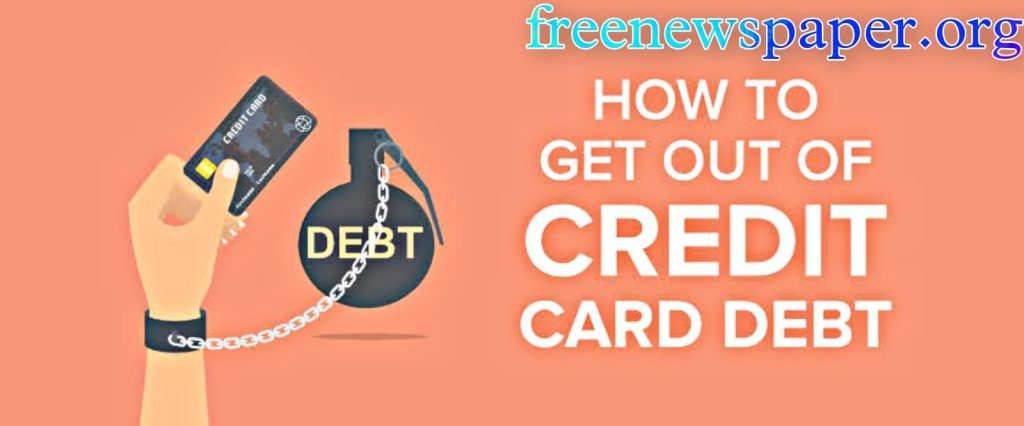One of the most common applications of personal loans, which may be used for everything from paying off medical debt to purchasing an RV, may be to consolidate credit card debt.
You may remove any monthly high-interest card payments and combine the debt into one monthly personal loan payment by using the proceeds of a personal loan to pay down credit card debt—often at a lower cost.
Personal loan debt vs credit card debt

Although the outstanding sums on credit card debt and personal loans are essentially the same, one may be less expensive. Although certain credit cards may have rates as high as 30%, interest rates on credit cards are normally between 12% and 24%.
Contrarily, personal loans often have lower interest rates, ranging from 3% to 30%. Considering that, you could think about taking out a personal loan to pay off your credit card debt because it normally costs you more in interest over time than debt from a personal loan.
The Use of a Personal Loan to Repay Credit Card Debt Has These 4 Advantages
Applying for a personal loan might be beneficial if you want to pay off your debt more quickly than you could by just paying the minimum amount due on your credit cards each month. However, a personal loan also has additional advantages.
1. You May Earn a Lower Interest Rate
Even while borrowers with good credit might pay around 12% to 17%, depending on the sort of card they hold, they might pay as much as 20% APR or more if they maintain a credit card debt.
Contrarily, personal loans often have interest rates that are less than 10%. In fact, if you have a good credit rating, the greatest personal loans are considerably more affordable than that.
As a result, you may pay off your debt more quickly and reduce the total amount of interest you pay by half.
2. Consolidation Streamlines Payments
It could be challenging to remember all the due dates and minimum amounts owing if you use several different credit cards each month.
You can be charged late penalties and your credit score might suffer if you skip a payment or don’t pay the minimum amount required.
You may pay off your debt more quickly by combining your credit card payments into one monthly payment on a personal loan. Reducing the number of payments allows for more time and room for other obligations.
3. You Could Boost Your Credit Score
While applying for a personal loan results in a rigorous credit check and momentarily lowers your credit score, a personal loan may have several positive effects on your score.
The 10% of your score that is made up of your credit mix is increased by taking out a personal loan.
By having a variety of debts and credit, you may demonstrate to lenders and creditors that you are responsible for the money.
Paying off your debt will help reduce your credit usage. Your credit utilization is the proportion of your available credit to how much you are now utilizing. Your credit card utilization will drop to 0% if you pay off your balances.
Great credit usage is thought to be around 30%, and ideally under 10%, and will assist you to better your rating.
4. You May Pay Off Debt Sooner
Depending on how much you owe, it can take you years or even decades to pay off your credit card bills if you simply make the minimum payments each month.
You may immediately pay off your credit card debt and create a repayment schedule for your single personal loan with the help of a personal loan. Depending on how much you borrow and your lender, terms change.
You could take out a personal loan and repay it in less than five years if you were on schedule to pay off your credit cards in ten years. Just be careful not to start the cycle over by piling up more credit card debt.
Use of a Personal Loan to Repay Credit Card Debt Has These Drawbacks

Consolidating credit card debt with a personal loan has various possible drawbacks, including the cost. Before making a choice, take into account these disadvantages as well.
1. Obtaining a Personal Loan May Increase Debt
If you take out a personal loan, you are borrowing extra money. If you take out a personal loan to pay off your credit cards, then use them again while carrying a balance, you’re collecting a further debt.
Use a personal loan for credit card consolidation only after exhausting other options, such as raising your monthly credit card payments or getting a balance transfer credit card.
2. You’re Not Guaranteed a Lower Interest Rate
Though not often the case, personal loans typically have lower interest rates than credit cards. If your credit is less than ideal, you could not be approved for a personal loan.
If you have lousy credit and get approved for a personal loan, your interest rate might not be any lower—and it might even be higher—than what you are already paying.
3. Personal Loans Have Fees, Too
Some lenders impose a variety of costs, such as late payment, origination, and insufficient funds penalties. As you compare personal loan lenders, keep this in mind.
How to Choose the Best Personal Loan
Numerous lenders provide personal loans, each with a distinct range of fees, interest rates, and conditions for repayment.
Personal loans don’t adhere to a single set of criteria, so depending on your eligibility, you can get a broad range of offers. When examining personal loan possibilities, take into account:
- Rates of interest. The finest personal loans will charge the greatest credit scores and the lowest interest rates. Your monthly payment will be cheaper and you’ll pay less interest overall if you have a higher credit score.
- Terms. Depending on the lender, your payback conditions also change significantly. Some companies offer payback terms of up to seven years, while others have durations of as little as six months. Locate a lender that provides a lender that offers shorter payback terms if you wish to pay off your debt sooner. Look for a lender with lengthier repayment terms if you need to keep your monthly payments low.
- Fees. The more loans you may qualify for without origination costs or other expenses, the higher your credit score is. If your credit isn’t the best, compare the costs charged by each lender and decide which ones, if any, you’d be willing to pay. For instance, is the late fee $15 or $30 if you skip a payment?
- Amount borrowed. While some people only require a little amount of borrowing, others require a sizable sum to pay off their debt.
- Different minimum and maximum amounts are offered by each lender. Additionally, how much you are permitted to borrow may be influenced by your credit score. Your ability to borrow more money increases with your credit score because lenders view you as a more reliable borrower.
Alternative Option: Balance Transfer Credit Card
You might be able to apply for a new credit card with a cheaper interest rate that permits you to transfer balances from your current credit cards. A credit card debt transfer has the following advantages:
- Free of interest charges. If you’re approved for a 0% APR balance transfer, you won’t be charged any more interest during the promotional period, allowing you to pay down your amount more affordable.
- No cost for balance transfers. When you transfer a balance, the majority of credit cards impose a fee; however, there is a handful that doesn’t.
- New benefits If your credit is fair. you could be eligible for a new credit card that rewards cardholders with cash back, travel benefits, or other benefits.
The disadvantages of transferring a credit card balance include
- Future interest fees. If you don’t pay off the remaining debt before the offer expires, interest may be applied to it.
- Loss of a marketing opportunity. Even if interest isn’t building up, you still need to pay the minimum amount due each month. Failure to do so might result in the loss of your promotional offer and the beginning of interest charges on your full debt.
- Missing the qualifications needed. You could not get approved for a new credit card line if your credit isn’t good.
- Not having a credit limit that is enough. Even if you meet the requirements, your whole amount might not move over since the card issuer gives you a lesser credit limit than you require. This implies that you are responsible for both the balance on your new card and any outstanding amounts on any previous cards.
Debt Snowball or Avalanche
You can also decide that making extra payments to one of your cards is the best approach for you to deal with your credit card debt.
The debt snowball or debt avalanche methods are the two most common approaches used. Utilizing one of these techniques has the following advantages:
- staying away from additional credit lines. These techniques allow you to concentrate on paying down your debt with what you already have rather than taking on more debt if you don’t have excellent credit or don’t want to.
- concentrating on topics of great interest. You pay off your debts in the order of greatest interest rate first using the debt avalanche approach. Long-term savings from doing this could be greater.
- concentrating on modest gains. The snowball approach to debt repayment prioritizes paying off the debt with the lowest balance first. This can be your greatest option if you need a speedy win.
Of course, there are disadvantages to these payout strategies as well.
- You could discover that it moves slowly. You could pay off your debt more slowly than you would with a personal loan if you increase your payments using only the funds you have available right now.
- It doesn’t go with your budget. You might not have any more money to devote toward increased credit card payments if your budget is already extremely tight.
How Can Credit Card Debt Be Consolidated Without Ruining Credit?
These queries affect your credit score for one year, but they only remain on your credit record for two years.
You may, however, take measures to counteract this short-term decline and gradually raise your credit score. For instance, if you are asking for a personal loan for the first time, it will raise your credit mix, which accounts for 10% of your FICO score.
Making on-time or early payments after you’ve opened a debt consolidation loan will help you raise your score as your payment history accounts for 35% of your FICO score.
Therefore, even if consolidating your credit card debt is likely to cause a brief decrease in your credit score, you may restore it by using prudent credit habits.